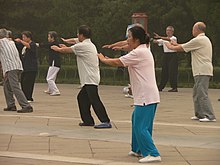
It turns out that doing the series of slow moving movements called Tai Chi reduces blood pressure more than vigorous aerobic exercise. This traditional Chinese exercise also has other benefits: it improves flexibility and balance, as well as cardiovascular and respiratory function.
A recent study found that doing the slow gentle movements and postures of Tai Chi (often called meditation in motion) for one year resulted in greater blood pressure reductions than aerobic exercises in persons with prehypertension. Half of a group of 349 adult volunteers were randomly assigned to Tai Chi for one hour 4 times per week for a year, while persons in the other group were randomly assigned to do aerobic exercises (including climbing stairs, jogging, brisk walking, and cycling) with the same frequency.
After one year, persons in both groups had lower blood pressure than at the start of the study, but in the Tai Chi group it was about 7.01 mmHg lower compared to 4.61 mmHg lower in the aerobic exercise group.
Prehypertension is blood pressure that is slightly higher than normal (between 120/80 and 139/89 mmHg), but not yet hypertension. In the study, the researchers also found that fewer persons from the Tai Chi group progressed to hypertension. A win-win.
The researchers of this study concluded that Tai Chi is a safe, moderate-intensity, mind-body exercise, which is suitable for persons of all ages and physical conditions. By the way, other studies also found that doing Tai Chi reduces blood pressure - as early as 12 weeks.
From NPR: Tai chi reduces blood pressure better than aerobic exercise, study finds
Tai chi, a traditional, slow-moving form of Chinese martial art, is known to increase flexibility and improve balance. Now, new research suggests it's better than more vigorous aerobic exercises for lowering blood pressure in people with prehypertension.
The new findings, published in the journal JAMA Network Open, add to a large body of research pointing to health benefits from tai chi, a wellness practice that combines slow, gentle movements and postures with mindfulness. It's often called meditation in motion.
In the study, researchers in China randomly assigned 342 adults with prehypertension to one of two interventions. The average age of participants was 49. Roughly half the people participated in supervised aerobic exercise, including jogging, climbing stairs, brisk walking and cycling. The other half was trained to practice tai chi. Both groups got hourlong sessions four times a week.
After 12 months, those in the tai chi group saw bigger drops in their blood pressure than those in the aerobic exercise group. What's more, nearly 22% of the people who practiced tai chi saw their blood pressure fall to within normal range, compared with nearly 16% of people in the aerobic exercise group. And fewer patients in the tai chi group went on to develop hypertension than in the aerobic exercise group.
Previous research has found that tai chi is more effective than brisk walking at lowering blood pressure, fasting blood sugar levels and perceived stress in people who have hypertension.
Studies have also shown that practicing tai chi can help reduce the risk of falls, improve balance and walking speed in older adults, and reduce depression and anxiety. Evidence suggests it can also help protect against cognitive decline and even boost memory. But you have to practice it consistently to reap the most benefit.
